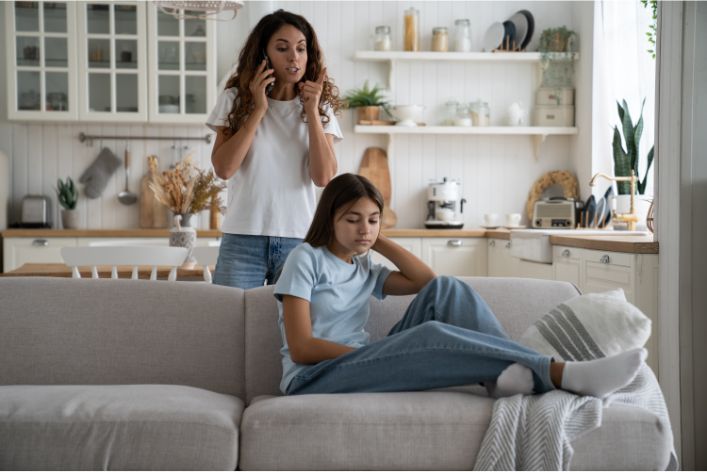Introduction
Nigerian parenting styles are significant because they reflect the values and beliefs of the Nigerian culture.
This post will provide a brief overview of the different Nigerian parenting styles and how they influence behavior in children.
Nigerian parenting styles are deeply rooted in the culture and traditions of the country. These styles have been passed down through generations and shape how parents raise their children.
Understanding these styles is important for anyone who wants to interact with Nigerians or raise children in a Nigerian household.
This post will explore four different Nigerian parenting styles: the authoritarian style, the permissive style, the authoritative style, and the uninvolved style.
Each style has its own unique characteristics and can lead to different outcomes in children.
By the end of this post, readers will have a better understanding of how Nigerian culture influences parenting behavior and the impact it can have on child development.
Overall, the importance of Nigerian parenting styles cannot be overstated. They play a significant role in shaping the socialization and development of children in Nigeria.
As Nigeria continues to grow and develop, it is essential to understand the cultural values and practices that shape the way children are raised in the country.
Read: Raising Respectful Kids: Nigerian Values and Discipline
Nigerian Cultural Beliefs and Values
Nigerian parenting styles are heavily influenced by cultural beliefs and values that have been passed down from generation to generation. These beliefs and values shape the behavior of Nigerian parents and the way they raise their children.
Importance of Respect for Elders
In Nigerian culture, respect for elders is highly valued and seen as a cornerstone of good behavior. Children are taught from a young age to respect their elders and to show deference to those who are older and wiser.
This respect is demonstrated through simple actions such as using formal language when addressing elders and avoiding eye contact as a sign of respect.
Nigerian parents are often strict with their children when it comes to showing respect for elders. They expect their children to be polite and respectful to older people, especially those within their family.
This is seen as a way to maintain family and community cohesion, and to ensure that traditional values are passed down to the next generation.
Parenting Made Just for You
Get personalized Parenting Solutions tailored to your child’s needs. Transform your parenting journey with expert guidance in 1-3 days.
Get StartedEmphasis on Communal Living
Nigerian culture places a strong emphasis on communal living, and this extends to parenting.
In many parts of Nigeria, extended family members live together in one compound, and it is common for grandparents, aunts, uncles, and cousins to help raise children.
Nigerian parents rely heavily on their family network for support and guidance when it comes to parenting.
They often seek the advice of older relatives when making decisions regarding their children’s upbringing.
This sense of community is important in Nigerian culture and is seen as a way to strengthen family ties and to pass on cultural traditions and values from one generation to the next.
Views on Education and Discipline
In Nigerian culture, education and discipline are highly valued and seen as key to a successful future.
Nigerian parents place a strong emphasis on education and view it as a way to improve their children’s future prospects.
Discipline is also seen as an important aspect of Nigerian parenting. Nigerian parents are often strict with their children and believe that instilling discipline early on is essential for their future success.
Children are expected to behave well, and disobedience is not tolerated. Discipline is often administered through physical punishment, although this practice is becoming less common in modern Nigerian society.
Generally, Nigerian parenting styles are heavily influenced by cultural beliefs and values. Respect for elders, emphasis on communal living, and focus on education and discipline are just a few of the aspects that shape the behavior of Nigerian parents and the way they raise their children.
Read: Coping with Childhood Obesity: A Guide for Parents
Parenting Styles in Nigeria
Parenting in Nigeria is influenced by the country’s rich culture, traditions and beliefs, as well as other external factors.
Different parenting styles exist in Nigeria, each with its own unique characteristics and effects on children’s behavior and development.
Here are the top three parenting styles in Nigeria:
- Authoritarian Parenting: This is the most popular parenting style in Nigeria and is characterized by strict rules and expectations for children. Parents who practice authoritarian parenting demand obedience and conformity from their children, with little or no regard for their emotions or opinions. Children raised under this parenting style tend to be quiet, obedient, and submissive but may have low self-esteem and lack social skills.
- Permissive Parenting: Permissive parenting lacks rules and boundaries for children, making it the opposite of authoritarian parenting. Parents who practice permissive parenting are lenient and indulgent, often giving in to their children’s demands and desires. Children raised under this parenting style tend to be aggressive, impulsive and lack self-control.
- Authoritative Parenting: This parenting style strikes a balance between authoritarian and permissive parenting. Parents who practice authoritative parenting set clear rules and expectations for their children but are also warm, responsive, and willing to listen to their children’s opinions. Children raised under this parenting style tend to be confident, self-reliant and have better social skills.
Effect of Parenting Style on Children’s Behavior
Each parenting style has its own unique effects on children’s behavior and development. It’s important for parents to understand the different parenting styles and choose the one that best suits their family’s needs and values.
Unveil the Perfect Name that Tells Your Family's Story
Let us help you find a name that embodies your family's values, traditions, and dreams. Our personalized consultation weaves cultural insights to create a name that's uniquely yours.
Get StartedIn Nigerian cultures, where respect for elders and authority is highly valued, authoritarian parenting may work best. However, this style of parenting may not be appropriate for children with strong personalities who may need more freedom to express themselves.
Permissive parenting may work where parents want to foster independence and allow children to explore their own desires and passions. However, this style may not be effective when it comes to setting boundaries or teaching children important values such as responsibility and accountability.
Experts consider authoritative parenting as the most effective and balanced form of parenting. This parenting style emphasizes communication, love, affection, and positive reinforcement while still providing clear rules and expectations for children. Children raised under this style typically exhibit confidence, success, and adaptability in school, career, and relationships.
Parents in Nigeria should choose a parenting style based on their values, beliefs, and their child’s individual needs. The child’s personality and developmental stage also matter.
Regardless of the style, it’s vital to offer children love, support, and guidance. They need this to tackle the challenges of a rapidly evolving world.

Read: Solutions for Common Child Health Issues in Nigeria
Find Out More: Effective Behavior Management Strategies for Nigerian Parents
Cultural influences on Nigerian parenting styles
Cultures influence parenting styles, which vary due to factors like religion, extended family dynamics, and shifting cultural attitudes. In Nigeria, these cultural influences have played a significant role in shaping traditional parenting practices.
Here are three key ways that Nigerian culture impacts parenting styles:
Impact of Religion on parenting styles
Religion is a major part of Nigerian culture, and it often dictates many aspects of daily life, including parenting practices. The two dominant religions in Nigeria, Christianity and Islam, both place an emphasis on discipline and respect for authority, which can translate into strict parenting styles.
Parents who adhere to religious teachings may use physical punishment to discipline their children, as they believe it is a way to instill obedience and respect.
However, there is a growing trend towards more lenient parenting styles among younger generations who take a less literal interpretation of religious texts.
Influence of Extended family on Child-rearing
The extended family plays a crucial role in Nigerian culture and can have a significant impact on child-rearing practices. Many households practice collective child-rearing, with grandparents, aunts, uncles, and cousins living together and raising children as a larger family unit.
Parents teaching children to prioritize the needs of the group over their individual desires leads to a communal parenting style. Extended family members also provide a support system for busy parents, often stepping in to help with childcare or household chores.
Shifting cultural attitudes towards parenting
As Nigerian society becomes more urbanized and parents have greater access to education and resources, cultural attitudes towards parenting are changing. There is a growing emphasis on child-centered parenting, where parents prioritize the needs and desires of their children above traditional cultural expectations.
This can mean more open communication between parents and children and a less authoritarian approach to discipline. However, some parents may struggle to reconcile these new attitudes with traditional cultural values.
Basically, cultural influences play a significant role in shaping Nigerian parenting styles. Religion, extended family dynamics, and shifting cultural attitudes all contribute to the unique parenting practices found in Nigeria.
Understanding and appreciating these cultural influences is crucial for anyone seeking to work with or parent Nigerian children.
Read: Safeguarding Child Health with Clean Water & Sanitation
Explore Further: Child Behavior: Common Challenges for Nigerian Parents
Gain More Insights: Cultural Impact on Discipline and Behavior in Nigeria
Advantages and Disadvantages of Nigerian Parenting Styles
Parenting styles have a tremendous impact on children’s development as they shape their cognitive, emotional, and social wellbeing. Culture heavily influences Nigerian parenting styles, which blend warmth, control, and strictness into their approach. While these parenting styles have positive outcomes, they also have some drawbacks.
Positive Effects of parental warmth and Control
- Children raised in a warm and loving environment have high self-esteem, improved academic performance, social competence, and good mental health.
- Control, as a form of discipline, helps establish rules, structure, and routine necessary for children’s development.
- Control helps children learn self-regulation and self-discipline, preventing impulsive actions that may lead to negative consequences.
- Nurturing a positive parent-child relationship strengthens the bond between parents and children.
Negative effects of harsh discipline and strictness
- Strict parenting may lead to anxiety, lowered self-esteem, and depression.
- The use of harsh physical discipline and verbal aggression can lead to aggressive, violent, and antisocial behaviors in children.
- Children raised in an extremely strict environment may become rebellious, have an unhealthy relationship with authority figures, and engage in risky behaviors.
- The excessive use of control may inhibit children’s social interaction and prevent them from exploring their abilities and taking risks.
Critical assessment of the different parenting styles
Nigerian parenting styles have a mixture of authoritarian parenting style (strict, controlling), authoritative parenting style (warm and controlling), and permissive parenting style (nurturing and less controlling). Each parenting style has its advantages and disadvantages.
Authoritarian parenting style: strict parenting
The emphasis on obedience and discipline helps children develop self-control, perseverance and better academic performance.
However, overuse of strict parenting may cause emotional stunting, low self-esteem, social anxiety, and depression.
Authoritative parenting style: warm and controlling
This parenting style fosters a positive parent-child relationship, a culture of communication and negotiation, and appropriate discipline.
Unbalanced levels of parental warmth and control can cause confusion, leading children to become either overly dependent or excessively rebellious.
Permissive parenting style: nurturing and less controlling
Such parenting style encourages verbal communication, freedom, and individuality among children.
However, the lack of monitoring or structure may lead to entitlement, heightened impulsivity, low academic performance, and lack of respect for authority figures.
Nigerian parenting styles have a mix of both positive and negative outcomes. It is essential to maintain an appropriate balance between warmth, control, and strictness as different children require unique parenting styles for optimal growth and development.
Parents must be aware of the consequences of their parenting styles and should strive to eject negative parenting styles while nurturing the positive ones. Ultimately, the goal of Nigerian parenting styles should be to raise well-rounded, happy, and productive children.
Conclusion
Throughout this blog section, we have explored the various Nigerian parenting styles and how cultural influences shape parenting behaviors.
From the strict and authoritarian style to the more permissive and indulgent style, we have seen how each approach has its advantages and disadvantages.
To improve Nigerian parenting styles, it is crucial to provide parents with effective educational programs that promote positive parenting practices.
Encourage parents to engage in open communication with their children, enabling autonomy and independence within reasonable boundaries.
Acknowledge the uniqueness of each child and tailor parents’ approach to their child’s needs, as it is essential. By doing so, Nigerian parents can foster a nurturing and positive home environment that promotes healthy child development.
Culture heavily influences Nigerian parenting styles, but it’s crucial to acknowledge that not all cultural norms and practices are advantageous. By adopting a more child-centered approach, Nigerian parents can promote healthy child development and secure a brighter future for their children.





you are truly a good webmaster. The site loading velocity is incredible.
It seems that you are doing any unique trick. In addition, The contents are masterwork.
you’ve done a great activity in this subject!
Thank you